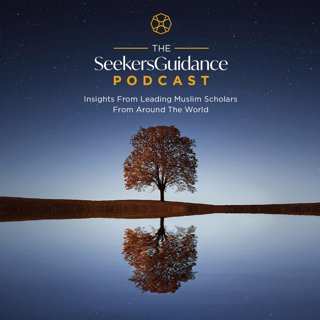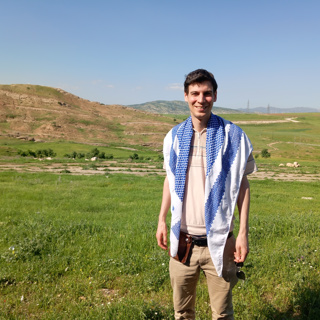
18: Marriage & Good Character – Renewal by the Book: Quran Tafsir Based on Imam Ghazali’s Ihya – Shaykh Faraz Rabbani
In this lesson, Shaykh Faraz Rabbani, gives an overview of select verses from the Quran that correspond with the chapter son marriage and good character from Imam Al-Ghazali’s Ihya. The two chapter have been enjoined in one lesson because marriage is highly dependent on good character. The lesson will overview the verse 20-21 from Chapter 30 of the Quran on the purposes of marriage. وَمِنْ آيَاتِهِ أَنْ خَلَقَكُم مِّن تُرَابٍ ثُمَّ إِذَا أَنتُم بَشَرٌ تَنتَشِرُونَ وَمِنْ آيَاتِهِ أَنْ خَلَقَ لَكُم مِّنْ أَنفُسِكُمْ أَزْوَاجًا لِّتَسْكُنُوا إِلَيْهَا وَجَعَلَ بَيْنَكُم مَّوَدَّةً وَرَحْمَةً ۚ إِنَّ فِي ذَٰلِكَ لَآيَاتٍ لِّقَوْمٍ يَتَفَكَّرُونَ And of His signs is that He created you from dust; then, suddenly you were human beings dispersing [throughout the earth]. And of His signs is that He created for you from yourselves mates that you may find tranquillity in them; and He placed between you affection and mercy. Indeed in that are signs for a people who give thought. [Quran, 3:20-21] Marriage is not just a sign of Allah but it contains within it numerous signs of Allah. The purpose of marriage is thus is a means to Allah. However, one must be careful because through marriage one can either draw closer to Allah with their spouse or further away by busying themselves with worldly matters that pull them away from Allah. In addition, marriage is a sign of Allah because He places in it the serenity, caring love and mercy that is needed for the marriage to function and are all gifts from Allah. Shaykh Faraz explains that there is also a general meaning to the verse above, that is not specific to spouses but rather applies to all human relations and that is the mercy and deep care that allows for human interactions to be sustained; this is one of the signs of Allah. The mercy and deep care spoken about in the verse were integral to the Prophetic Character that we are all encouraged to emulate. As such, at the heart of a good marriage and knowing how to interact with others is good character. وَإِنَّكَ لَعَلَىٰ خُلُقٍ عَظِيمٍ “And truly you are upon tremendous character” [Quran, 68:4] One’s character is most manifest in their choices, particularly the difficult ones. Good character also requires a higher purpose and that is to respond for Allah. In this series Shaykh Faraz, and the other scholars and teachers will be looking at points of reflection from key verses in the Quran. The series will follow the thematic order of Imam Ghazali’s Ihya Ulum al-Din (Renewing the Religious Sciences). The aim is to connect the key verses of guidance from the Book of Allah with the blueprint of renewal, the Ihya, so that we experience a renewal by The Book. Join our Ramadan 2017 program: #RamadanRenewal, in-person at SeekersGuidance Toronto or online through the SeekersGuidance Global platform. For more details, visit: http://seekershub.org/ramadan2017. Checkout all of the SeekersGuidance podcasts by visiting https://seekersguidance.org/podcasts/
24 Kesä 201724min

19: Spiritual Music – Renewing Religion: An Overview of Ghazali’s Ihya – Shaykh Faraz Rabbani
In this lesson, Shaykh Faraz, gives an overview of the chapter on spiritual music from Imam Ghazali’s Ihya. In this chapter, the Imam’s reference to music is constrained only to spiritual music and should be understood as such for the remainder of the lesson. This is music that inspires to seek Allah and His messenger. WIthin the Islamic tradition there is a broad permissibility of singing. There are numerous examples of the companions singing spiritual poems as they dug trenches or during weddings. That is also the reason why the Prophet had his own poets. Thus there was a general understanding of the permissibility of spiritual singing. The Prophet also encourage beating the ‘duff’ at weddings. Conversely, however, many scholars believe that other musical instruments are not allowed within Islam. There are a minority of scholars that allowed music as long as the environment in which the music is, is not associated with other sinful acts such as dancing. Shaykh Faraz outlines in the lesson the etiquettes of listening to music: [1] Music is powerful so be cautions of what you listen to. Thus listen to music that inspires you to yearn for the Divine. [2] Actions are by their intentions, so you need to be clear as to why you are listening to something and what you hope to gain from it [3] There is a rich tradition in Islam of appreciating beauty and beautiful things. [4] The sunna of music is listening to that which praises Allah and Messenger or that which inspires one to turn to Allah and his messenger; or that which allows one to relax. Shaykh Faraz concludes by reminding us to uphold caution and stick to what is permitted to music and continue to listen to it with purpose and intention. Lastly, remember that the greatest of what you can listen to is the Quran. In this brief overview of Imam Ghazali’s opus magnum, Ihya Ulum al-Din (Renewing the Religious Sciences), this series will serve as blueprint for how the believer can bring to life their religion. It will aim to help the believer to not just practice the form of the religion properly, but to also practice it with excellence. Join our Ramadan 2017 program: #RamadanRenewal, in-person at SeekersGuidance Toronto or online through the SeekersGuidance Global platform. For more details, visit: http://seekershub.org/ramadan2017. Checkout all of the SeekersGuidance podcasts by visiting https://seekersguidance.org/podcasts/
24 Kesä 201729min

17: Commanding the Good – Renewal by the Book: Quran Tafsir Based on Imam Ghazali’s Ihya – Shaykh Faraz Rabbani
In this lesson, Shaykh Faraz Rabbani, gives an overview of select verses from the Quran that correspond with the chapter on commanding the good from Imam Al-Ghazali’s Ihya. The lesson will overview the verse 104 from Chapter 3 of the Quran that encompasses all that one needs to know about commanding the good. وَلْتَكُن مِّنكُمْ أُمَّةٌ يَدْعُونَ إِلَى الْخَيْرِ وَيَأْمُرُونَ بِالْمَعْرُوفِ وَيَنْهَوْنَ عَنِ الْمُنكَرِ ۚ وَأُولَٰئِكَ هُمُ الْمُفْلِحُونَ And let there be [arising] from you a nation inviting to [all that is] good, enjoining what is right and forbidding what is wrong, and those will be the successful. [Quran, 3:104] These verses explain the common principles that underlie commanding the good for any person. First, it identifies commanding good as a communal obligation that must be undertaken by some from within that community. Second, some from within the community who are able to and have the knowledge should be dedicated to this duty, while others are required to engage in it based on circumstances and if they have have the know how. Thirdly, the basis for calling to good is calling people to that which is known to be virtuous, bringing people closer to all that is good for them. This must come from a place of sincere concern for the person and the community. Fourthly, there is a social responsibility embedded in each person’s personal responsibility to enjoin the good. Shaykh Faraz reminds us that the religion itself revolves around sincere concern and that entails wanting good for others as you would for want for yourself. That is why a subset of the community is required to enjoin the good and forbid the evil. The way to forbidding the evil applies only to matters that are prohibited. Thus one should only command the good when it is required and when one knows that it will bring upon benefit. The way to do so, is through having sincere concern, mercy and being positive in the way you deliver your messaging throughout. Imam al-Shafi’i advises that giving council should be done in private so as to not humiliate people and is likely to get them to listen more and act upon the council. Shaykh Faraz concludes with advising those enjoining the good do so with mercy, wisdom, and sincere concern. In this series Shaykh Faraz, and the other scholars and teachers will be looking at points of reflection from key verses in the Quran. The series will follow the thematic order of Imam Ghazali’s Ihya Ulum al-Din (Renewing the Religious Sciences). The aim is to connect the key verses of guidance from the Book of Allah with the blueprint of renewal, the Ihya, so that we experience a renewal by The Book. Join our Ramadan 2017 program: #RamadanRenewal, in-person at SeekersGuidance Toronto or online through the SeekersGuidance Global platform. For more details, visit: http://seekershub.org/ramadan2017. Checkout all of the SeekersGuidance podcasts by visiting https://seekersguidance.org/podcasts/
24 Kesä 201725min

18: Enjoining Good & Forbidding Evil – Renewing Religion: An Overview of the Ihya – Shakh Riad Saloojee
In this lesson, visiting scholar, Shaykh Riad Saloojee gives an overview of the chapter on enjoining the good and forbidding the evil from Imam Ghazali’s Ihya. This chapter is divided into a number of topics: [1] the importance of of enjoining the good and forbidding the evil [2] the conditions and etiquette of enjoining the good and forbidding the evil [3] the integrals of doing so. The Prophet, peace be upon him, said: “Whoever of you sees a wrongdoing then let him change it with his hand. If he is not able to do so, then with his tongue. And if he is not able to do so, then let him feel it wrong with his heart. And that is the weakest of faith.” This hadith gives us an opportunity to understand the meanings of hadith from the text. The way this text has many lessons that have been derived from it by our scholars. In order to derive meaning from a text one must first have an understanding of fiqh theory and principles. The application of the text must produce benefit, because the whole religion is bring upon benefit. In order for one to begin enjoining the good and forbidding the evil, one must first ask themselves these questions: [1] How sure am I of the legal ruling? [2] Is this a matter of difference between scholars? [3] If we believe it is definitely wrong, will be there be a benefit in discouraging it? Consider the probable consequences of your actions. [4] Can they understand what you will say? Should you then speak in detail or in summary? [5] Always begin with gentleness, wisdom and being nice [6] Check your motives first, and if they are in any way egotistical then you should not enjoin good or forbid evil in that moment… Only then should one speak Shaykh Riad reminds us that this whole enterprise rests on having good character and that is dependent on a sound heart that is attached to Allah. This hadith can apply to all types of activism that one might want to undertake. Lastly, never think that your advice or doing is indispensable so if you feel like your intentions are not sound for what you are about to say or do, then do not do it. In this brief overview of Imam Ghazali’s opus magnum, Ihya Ulum al-Din (Renewing the Religious Sciences), this series will serve as blueprint for how the believer can bring to life their religion. It will aim to help the believer to not just practice the form of the religion properly, but to also practice it with excellence. Join our Ramadan 2017 program: #RamadanRenewal, in-person at SeekersGuidance Toronto or online through the SeekersGuidance Global platform. For more details, visit: http://seekershub.org/ramadan2017. Checkout all of the SeekersGuidance podcasts by visiting https://seekersguidance.org/podcasts/
24 Kesä 201730min

16: Travel: Purpose, Reflection, Gratitude – Renewal by the Book: Quran Tafsir Based on Imam Ghazali’s Ihya – Shaykh Faraz Rabbani
In this lesson, Shaykh Faraz Rabbani, gives an overview of select verses from the Quran that correspond with the chapter on travel from Imam Al-Ghazali’s Ihya. This chapter focuses on the purpose of travel, reflection in travel, and gratitude from it. The lesson will overview the verses 12-14 from Chapter 43 of the Quran on the duaas one should recite when travelling. وَالَّذِي خَلَقَ الْأَزْوَاجَ كُلَّهَا وَجَعَلَ لَكُم مِّنَ الْفُلْكِ وَالْأَنْعَامِ مَا تَرْكَبُونَ لِتَسْتَوُوا عَلَىٰ ظُهُورِهِ ثُمَّ تَذْكُرُوا نِعْمَةَ رَبِّكُمْ إِذَا اسْتَوَيْتُمْ عَلَيْهِ وَتَقُولُوا سُبْحَانَ الَّذِي سَخَّرَ لَنَا هَٰذَا وَمَا كُنَّا لَهُ مُقْرِنِينَ وَإِنَّا إِلَىٰ رَبِّنَا لَمُنقَلِبُونَ And who created the species, all of them, and has made for you of ships and animals those which you mount. That you may settle yourselves upon their backs and then remember the favor of your Lord when you have settled upon them and say. “Exalted is He who has subjected this to us, and we could not have [otherwise] subdued it. And indeed we, to our Lord, will [surely] return.” [Quran, 43:12-14] Saying this prayer, even if one may not understand the arabic phrasing, is of benefit to you. Because, everything in the sunnah we are encouraged to do is of benefit to us both worldly and spiritual. The first verse, reminds us of the vehicles that Allah has facilitated for us to put to use. The purpose of the blessing is not to enjoy it but to be grateful for the Bestower. Scholars remind us that there are spiritual benefits to travelling. Planning for travel should not simply be the logistics of travel but the intentions behind travelling. We are reminded of this in the hadith of the Prophet on intentions “migration to Allah and His Prophet”. However, some of the companions had migrated for various reasons and intentions other than that. And the Prophet, peace be upon him, said that their migration was “for whatever they migrated for”. What intentions should one have when travelling? [1] Neediness upon Allah [2] Reliance upon Allah [3] Worship [4] Upholding good character [5] Have good company when travelling [6] Doing good while travelling [7] Calling to Allah [8] Remembrance and devotion Shaykh Faraz concludes by reminding us that we should seek to appreciate the blessings of the modes of transportation that we have been provided. We also should appreciate the opportunities for the acts of remembrance that we’ve been provided with at various instances during the day, including during travel. Lastly, Shaykh Faraz ends with council from Imam ibn al-Banna on purposeful travel. In this series Shaykh Faraz, and the other scholars and teachers will be looking at points of reflection from key verses in the Quran. The series will follow the thematic order of Imam Ghazali’s Ihya Ulum al-Din (Renewing the Religious Sciences). The aim is to connect the key verses of guidance from the Book of Allah with the blueprint of renewal, the Ihya, so that we experience a renewal by The Book. Join our Ramadan 2017 program: #RamadanRenewal, in-person at SeekersGuidance Toronto or online through the SeekersGuidance Global platform. For more details, visit: http://seekershub.org/ramadan2017. Checkout all of the SeekersGuidance podcasts by visiting https://seekersguidance.org/podcasts/
20 Kesä 201724min

17: Etiquettes of Travel – Renewing Religion: An Overview of Ghazali’s Ihya – Shaykh Riad Saloojee
In this lesson, visiting scholar, Shaykh Riad Saloojee, gives an overview of the chapter on the etiquettes of travel from Imam Ghazali’s Ihya. The chapter begins by discussing the two types of travel, that of the body and that of the heart. Then, he continues to the purposes of travel, the etiquettes of travel and lastly, the fiqh of travel. The travelling of the body is really just a means for the travelling of our hearts. There are various purposes and reasons that one should travel for including: [1] Breaking bad habits [2] Gaining knowledge [3] Spending time with scholars and the righteous [4] Witnessing the miracles of Allah’s creation [5] Leave an environment that is harmful [6] Pilgrimage In addition, our religion is filled with instances of small journeying to Allah, such as having to leave one’s home to go to the mosque for congregational prayer or for Friday prayer. This is all for one to journey and to leave with the purpose of seeking Allah. The Prophet’s, peace be upon them, often journeyed as well to Allah, seeking Him. Of the meanings of the word of travel is that it unveils to one: their own faults and characteristics, how they handle tests, and how they treat others. Furthermore, it unveils to you various fruits of spiritual journeying to Allah. Shaykh Riad reminds us that spiritual journeying does not need the travel of the physical body. One should check on a daily basis how they are doing on their spiritual journey, if they are moving forward or backwards? Am I more attached to Allah, and less attached to worldly things on a daily basis? If one does not do this, then years will pass without us noticing that we have not changed anything in our spiritual journeying. Shaykh Riad concludes with a reminder that it is of the utmost importance for us to continually check if we have journeyed closer to Allah during Ramadan or if we have remained stagnant and to renew our intentions for the rest of the month. In this brief overview of Imam Ghazali’s opus magnum, Ihya Ulum al-Din (Renewing the Religious Sciences), this series will serve as blueprint for how the believer can bring to life their religion. It will aim to help the believer to not just practice the form of the religion properly, but to also practice it with excellence. Join our Ramadan 2017 program: #RamadanRenewal, in-person at SeekersGuidance Toronto or online through the SeekersGuidance Global platform. For more details, visit: http://seekershub.org/ramadan2017. Checkout all of the SeekersGuidance podcasts by visiting https://seekersguidance.org/podcasts/
20 Kesä 201723min

The Levels and Opportunity of Fasting – Shaykh Riad Saloojee
In this Friday sermon, Shaykh Riad Saloojee highlights the different levels of fasting. He urges us to strive to uphold higher levels of fasting, by engaging our limbs in that which pleases Allah, and holding them from disobedience. Shaykh Riad emphasizes the great opportunity that lies within Ramadan, and calls us to make the most of what is left of it. True Eid, he reflects, is when at the end of Ramadan we have been drawn closer to Allah. Join our Ramadan 2017 program: #RamadanRenewal, in-person at SeekersGuidance Toronto or online through the SeekersGuidance Global platform. For more details, visit: http://seekershub.org/ramadan2017. Help Seekersguidance build a Global Islamic Seminary and spread the light of guidance to millions around the world by supporting us through monthly donation by going to https://seekersguidance.org/donate – your donations are tax deductible in the US and Canada. Checkout all of the Seekersguidance podcasts by visiting https://seekersguidance.org/podcasts/.
14 Kesä 201727min

The Impact and Fruits of Worship in Ramadan and Beyond – Shaykh Faid Mohammed Said
In this Friday sermon, Shaykh Faid Mohammed Said calls us to make the most of what is left of Ramadan. He provides key advice on how to engage in worship that impacts and reflects on us positively. The impactful and fruitful worship he talks about is one that rectifies our character, and lasts beyond Ramadan. Shaykh Faid gives multiple examples of worship with lasting impact through multiple stories of the companions of the Prophet Muhammad (peace and blessings upon him and his folk). This Friday sermon was delivered at Jame Masjid Mississauga (Coopers Masjid), on June 9th, 2017. With special thanks to Ustadh Nazim Baksh for providing the recording of the sermon. Join our Ramadan 2017 program: #RamadanRenewal, in-person at SeekersGuidance Toronto or online through the SeekersGuidance Global platform. For more details, visit: http://SeekersGuidance.org/ramadan2017. Help Seekersguidance build a Global Islamic Seminary and spread the light of guidance to millions around the world by supporting us through monthly donation by going to https://seekersguidance.org/donate – your donations are tax deductible in the US and Canada. Checkout all of the SeekersGuidance podcasts by visiting https://seekersguidance.org/podcasts/.
14 Kesä 201725min





















